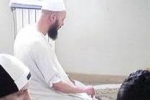09 November 2007
Radical Islam Behind Bars; Islamist prison chaplains face renewed challenge.
AS REPORTED AT LENGTH in THE WEEKLY STANDARD--the latest commentary appeared here on September 16, 2007--federal, state, county, and city prison officials have wrestled since the horror of 9/11 with the presence of radical Muslim chaplains in our country's correctional systems. To the shock of most Americans, when they hear about it, missionaries of the ultrafundamentalist Wahhabi sect, financed by Saudi Arabia and supporting terrorism, have a monopoly on Muslim chaplaincies behind bars. Similar patterns of "authorized" prison infiltration by Islamists are visible in Britain, Russia, and other countries.
The U.S. Justice Department and related authorities are disinclined to take serious action about this problem, even though a jail is the last place Muslim radical recruiters should be allowed free access, much less employment under the pretext of religious services and counseling to inmates. As thoroughly established in the public record, Saudi-subsidized and Wahhabi-trained chaplains preach extremism, including contempt for Western law, to convicts. This contrasts rather obviously with the presumed role of prison chaplains in seeking rehabilitation of lawbreakers.
Moderate Muslim groups have collected stacks of letters from disgruntled prisoners describing sermons in favor of al Qaeda, discrimination and threats against dissident Muslims, confiscation of anti-radical Muslim literature, and similar abuse by Islamist chaplains in prisons. In the absence of relief from penal authorities, however, Muslim victims of radical Islam in America's jailhouses have been compelled to file legal complaints that, until a few weeks ago, were routinely dismissed.
The main such case has involved a small
group of Shia Muslims in the New York prisons, who demand separate religious services, away from Wahhabi control and incitement of anti-Shia hatred by the chaplains. The Shias allege government violation of their rights to equal use of public facilities, as well as pro-Wahhabi favoritism, which is presumably illegal under the First Amendment. In 2006, the Shia prisoners' suit against the state of New York, entered in federal court, was thrown out--not for the first time.But in a new and promising development, three members of the federal Second Circuit Appeals Court have overturned the 2006 decision and sent the Shia case, now designated Orafan et al v. Rashid et al, back to the district court for trial. The appeals judges--Roger Miner, José Cabranes, and Paul Crotty--held on September 28, 2007, that issues of religious freedom and the obligation of the prison system to act fairly are unresolved, and must be fully heard.
Reinstatement of the complaint by the Shia prisoners against the Wahhabi chaplains in New York is not only commendable, it is of great significance for the security of our country. While some observers may try to turn the New York controversy into a parallel of Sunni-Shia conflict in Iraq, that is only a dramatic detail, not the essence of the case. The real issue is the power of radical Muslim chaplains and the discrimination against non-Wahhabis they exercise with impunity. Unfortunately, the state of New York has established Wahhabism as "official Islam" for convicts. Positive resolution of the issue means more than guaranteeing the rights of Shia Muslims who are doing time--it requires that radical chaplains be driven out of American prisons.
POSTED BY /http://www.homestead.com/
18:20 Posted in UNITED STATES | Permalink | Comments (0) | ![]() Facebook |
Facebook |




















The comments are closed.